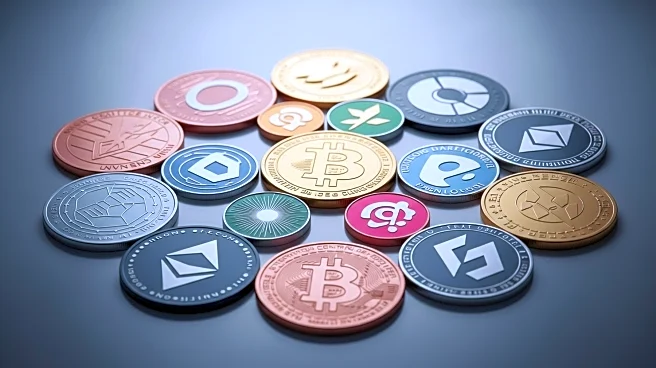What's Happening?
Bitcoin's recent price correction has led to increased interest in altcoins, as investors seek alternative opportunities in the cryptocurrency market. Analysts suggest that altcoins may experience higher trading volumes and capital inflow due to evolving risk appetites in response to Bitcoin's volatility. Historically, Bitcoin corrections have coincided with surges in altcoin activity, supported by strategic dealmaking in the financial sector. The decline in Bitcoin's dominance could create a favorable environment for altcoin growth, particularly if investors are looking to capitalize on undervalued opportunities. This trend is further supported by a rise in crypto-related mergers and acquisitions, including deals focused on blockchain, DeFi, and fintech sectors.
Why It's Important?
The shift towards altcoins signifies a potential diversification strategy among crypto investors, which could lead to a more balanced cryptocurrency market. As Bitcoin's dominance wanes, altcoins with unique value propositions and strong fundamentals may attract greater interest, potentially leading to increased innovation and investment in alternative technologies. This dynamic is crucial for the maturation of the crypto market, as strategic partnerships and integrations could play a critical role in the development of altcoin projects. Additionally, Mastercard's integration of stablecoins into its global payments network highlights the convergence between traditional finance and digital assets, potentially boosting institutional adoption.
What's Next?
Investors should approach the current market shift with caution, as the crypto market remains highly volatile and subject to various factors. Monitoring key indicators such as trading volumes, on-chain activity, and broader market trends will be essential for making informed decisions. The recent surge in fintech M&A activity suggests that strategic partnerships and integrations may also play a critical role in the development of altcoin projects seeking to capture a larger share of the market.
Beyond the Headlines
The broader implications of this shift include potential regulatory challenges and technological advancements that could reshape the cryptocurrency landscape. As altcoins gain traction, there may be increased scrutiny from regulators aiming to ensure market stability and protect investors. Furthermore, the integration of digital assets into traditional financial systems could lead to long-term shifts in how financial transactions are conducted, potentially influencing global economic structures.









